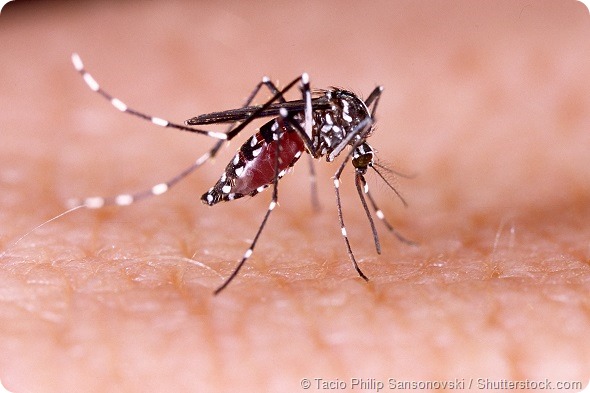The repellents that are used today are mostly based on what we call chemical pesticides. These products are used to repel mosquitoes as well as ticks. They are very broadly used, but there are different issues surrounding their use.
The first issue is that if you want to have protection that lasts a long time – for more than five or six hours– you have to use a high concentration of the pesticide. With that, comes some usage restrictions, such as not being able to use it on children and only being able to use the product a certain number of times per day.
Also, some of the pesticides are plasticizers, which means they will dissolve plastic, making them difficult to use while fishing, hunting or camping, for example.
If you want to reduce the side effects, you have to use pesticides that are less strong, but that means protection does not last very long – approximately 1 to 2 hours. A person who wants to be protected against mosquitoes always has to compromise between efficacy on the one hand and safety on the other. That's where our technology would help the dilemma.
We have developed a plant-based technology that is very safe, but also very efficacious. We have tested the technology scientifically and clinically and found it provides long-term protection. It provides up to 8 hours of protection against mosquitoes, with an active ingredient that is not a chemical pesticide.
The mosquito is the most dangerous animal on the planet. Mosquitoes kill 700,000 people a year and there are 300 million people who have diseases transmitted by mosquitoes, so it's a major issue.
The diseases transmitted include malaria and dengue fever and of course Zika. The Zika virus is a very big problem at the moment, unfortunately it's not the only one and it's probably not the last one.

Please can you give an overview of the different types of insect repellent? What is DEET and why don’t all insect repellents contain it?
DEET is the most commonly used repellent around the world because it was created as a pesticide in high concentrations and it's the most efficacious. We have seen a growing tendency to use higher concentrations of the product, probably because mosquitoes are becoming resistant to the lower doses used as repellent. With that, come issues about how frequently you can use the product and on which age-groups you can use it.
We have seen products on the market moving from low to high concentration, now up to 30%, 50%, and sometimes 100% DEET. We have also seen other products being introduced.
DEET is a 60-year old molecule, so it's not new. There have been some attempts to come up with new molecular chemistry that is a little less harsh than DEET, but they are also much less efficacious. There are not a lot of good alternatives today on the market for DEET.
How do non-DEET repellents compare to DEET-based repellents in terms of efficacy?
We have been developing our technology and testing it against the gold standard in the market, which is DEET. We have done a lot of testing with independent labs and clinical testing. We have been able to come up with a higher protection level and greater efficacy than the traditional DEET used by families, which is a concentration of about 15-20%. Typically, these products protect for around 3 to 4 hours, whereas our strongest formula protects for up to 8 hours.
Compared to a very high concentration of DEET (50%) that people sometimes want to use, we can offer exactly the same level of protection, but with a lot less restrictions on use. It can be used on children and there is no problem regarding plastic. There is also no restriction on how frequently it can be used. Overall, we compare very well against DEET.
What implications do you think non-DEET repellents could have for Zika?
I would say you have to be a little cautious about the non-DEET products. There are a lot of them on the market and you have to make sure that they have been very thoroughly tested.
A lot of the products are not tested and I would therefore be cautious about knowing exactly what you are using if you want to get the proper protection against any type of disease transmitted by ticks or mosquitoes.
Are mosquitoes carrying the Zika virus likely to become resistant to insect repellents?
Eventually, if you use a large amount of neurotoxic pesticides, you develop resistance which is now documented against DEET. Again, mosquitoes have been carrying a lot of diseases beyond the Zika virus, so control of mosquitoes is a major problem that goes beyond just controlling mosquitoes that transmit Zika. They also transmit malaria and dengue fever, so you can see the issue here that needs highlighting is more the usage of one molecule for a long period of time, at a large scale.
What you want to do to avoid any type of resistance is to diversify the method of control - there are different ways to do this. There are researchers spending a lot of time looking at the genome of mosquitoes. We propose another alternative, which is a plant-based, efficacious product. I would recommend the usage of different tools to control the mosquitoes in order to avoid resistance.
What do you think the future holds for insect repellents and Zika and how do TyraTech plan to add value?
What we see on the market is a good portion of people who don't want to use repellents because either they don't like the fact that they are pesticides, or they don't like the cosmetic aspect of it.
In addition, the high doses of DEET are not recommended for children under the age of 17 and pregnant women. This poses a strong potential risk because some people would prefer not being protected than putting pesticides on themselves or on their children.
Another issue is that even among the people who are using current pesticides, a good portion of those are reluctant users. You really want to promote people protecting themselves against mosquito bites because there is a good proportion of people who would not use pesticides and an overall risk of a good proportion not getting protected. We offer these people a true alternative.
To conclude, I would like to emphasize that the problem is that we're not winning the war against insects. Even though, right now, we're using 5 billion tons of pesticides around the world every year, we're not winning the war.
We need to innovate and bring new solutions to control and repel these insects. We are proposing here to really work actively in that field to find alternatives to pesticides.
We all know the issues around pesticides, which are neurotoxicity and pollution of the environment. Regulatory agencies around the world are looking at that very carefully, to reduce the number of pesticides. At TyraTech, we want to participate in that conversation with our technology and we want to be able to propose alternatives to families, to children and to industrial producers of animals.
Where can readers find more information?
About TyraTech
TyraTech is a green technology company that has developed technology to control insects and parasites without using pesticides. Our mission is to reduce the usage of pesticides everywhere we can, including use on humans, animals and agriculture.
We have a plant-based technology that is proven and, right now, we have 29 patents with many more pending. This is a technology that applies to different types of environments where insects are affecting humans or animals. The animals may be pets or industrially produced chicken.
Our customers are people who are really interested in healthy living and healthy food because there is a link between pesticide use and pesticide residues found in food.
Our customers are also people who are concerned about sustainable growth and a clean environment.
We have a fairly broad base for the application of our technology. One product we have on the market right now is a head lice product for kids. We also have products for the large industrial production of animals such as chicken and pigs and an insect repellent for mosquitoes and ticks.
About Bruno Jactel, DVM
Bruno Jactel, D.V.M. was appointed as Chief Executive Officer of TyraTech effective 10 January 2013. Jactel spent 12 years at Merial Limited, the $2.6 billion revenue generating Animal Health subsidiary of the Sanofi Group, most recently serving as combined Chief Strategy Officer and Chief Marketing Officer.
Prior to working at Merial, Jactel was Deputy Minister for Economic and Commercial Affairs at the French Embassy in Washington, D.C. Dr. Jactel is a Doctor of Veterinary Medicine and has a Masters in Economic Sciences from the Sorbonne University in Paris. He graduated from the École Nationale d’Administration, Paris in 1993.